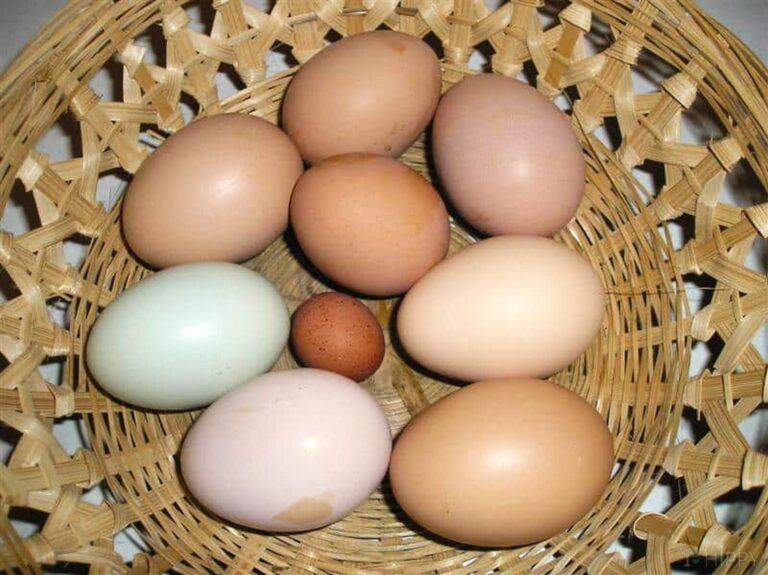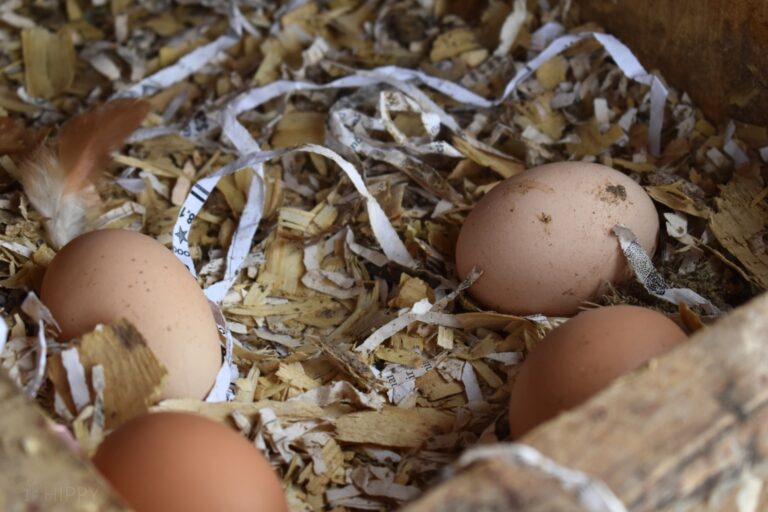New chicken keepers frequently ask the question, “How often should you collect chicken eggs?” This is a great question to ask because not only do we love our chickens, we love their eggs!
And part of chicken keeping is making sure that we have the best, cleanest, healthiest eggs we can. A big part of having healthy eggs is collecting them at the right time and the right frequency.
You should definitely collect eggs every single day. This will help make sure the eggs stay clean, fresh, and edible. However, you will probably want to collect your eggs more frequently, up to three or four times a day, depending on a number of factors in your area.

These factors include:
- Climate
- Number of chickens in your flock
- Cleanliness of your coop and nest boxes
- Willingness of your chickens to use the nest boxes
- Broodiness of your chickens
- Local predators
- Accessibility of your chicken coop
- Your daily routines
When Do Chickens Lay Eggs?
Understanding when chickens lay eggs will help you know when and how often to collect them. According to roysfarm.com, chickens generally lay eggs in the morning, and usually within 6 hours of sunrise.
This can help you time your egg collecting for when most of your hens have laid their eggs.
If sunrise is at 6:00 am, most of your hens will be done laying by noon and you can go collect the eggs then, being assured that you will have been able to get most of the eggs that are going to be laid that day.
However, it takes 26 to 28 hours for a hen to produce one egg, so this timing is approximate. Other variables, such as the hen’s age, care, and breed can affect what time of day the hen actually lays her egg.
While most eggs are laid in the morning hours, it isn’t unheard for a hen to lay her eggs later in the afternoon or evening, and occasionally, in the middle of the night.
Generally speaking, most hens will finish laying for the day by late morning, so this is a good time to begin collecting eggs.
You can also listen for your hens to sing the egg song – a good rooster will join in, too! – and collect all the eggs you find after your hens are done with their singing.
How Often Should You Collect Eggs Based on Climate Considerations?
One of the first things to consider when you decide how often to collect is the climate you live in.
Extreme climates require more frequent egg collection than more mild climates. If your temperatures are very hot, your eggs could overheat and spoil quickly.
In this case, you’ll probably want to collect your eggs at least twice a day to prevent spoilage. Also, bacteria from excrement multiplies much more quickly in the heat, so this is also a consideration.
Collect once in late morning, after the hens are done laying, and perhaps again in the evening and/or when you lock them up for the night.
This will ensure that the bulk of the eggs are collected before the heat of the day and you’ll be able to snatch up any eggs that were laid during the afternoon.
Keeping your eggs cooler and preventing more contact with chicken poop will keep the eggs fresher and healthier in hot weather.
If your climate or seasonal temperatures are very cold, you may want to collect your eggs two or three times a day. The cold weather is likely to make your eggs freeze, so frequent collection is a must to prevent broken eggs.
Frozen eggs are much more likely to crack as the liquid inside expands when frozen. If an egg freezes and does not crack, you can still eat it once it thaws, however, the texture and consistency of the egg will be affected.
These eggs are best used in baking rather than for omelets or scrambling but they are still usable.
If your frozen egg has already cracked, simply throw it away. A crack in the egg will allow bacteria to enter the shell and contaminate the egg white and yolk. You don’t want this bacteria in your cooking.
Also, because chickens tend to spend more time in the coop during bad or cold weather, there will be more excrement and bacteria in the coop that could infect the eggs. Prevent egg freezing by collecting the eggs often.
If you cannot make it out to your coop multiple times a day in the cold, you could try closing off several nest boxes so the chickens must share the same couple of nest boxes.
This will help warm up the eggs as the next hen goes in the nest box to lay. Insulating the coop (but still allowing for proper ventilation) may keep the coop warmer inside, giving you a little more time.
Also, some chicken keepers recommend putting hot water bottles in the nest boxes in the morning to extend the amount of time they can wait to collect the eggs before the eggs will freeze.
A broody hen, such as a silkie, will sit on the eggs and keep them warm for you, but be sure to collect the eggs often so they don’t begin to develop into chicks.
During the fall and spring, or the more temperate times of the year, you may be able to get away with only collecting your eggs once a day, but twice is always better.
Collect at Least Once Per Day to Keep the Eggs at the Right Temperatures
Another reason it is important to collect eggs at least once per day is keeping the eggs at the right temperature.
The temperature of your refrigerator is probably at or just below 40 degrees Fahrenheit. When an egg is first laid, it will feel warm to the touch and slowly cool off.
The more times the temperature changes, and the more time the temperature of your egg changes, the more likely that it will get microscopic cracks that allow bacteria into it.
If the temperatures in your area shift dramatically during the day and evening, you’ll want to collect as often as the temperatures change to protect the eggs.
For example, if you are going to put your eggs into the fridge, you don’t want them to go from hot (from the chicken) to cold because the morning is cold, to hot in the afternoon, to cold into the fridge. Try to keep the temperatures steady for the best tasting and freshest eggs.

Collect 3 Times a Day to Keep the Eggs Clean
Let’s be real. Chickens poop. Chickens walk in poop. Chickens get poop on their eggs. So one of the best reasons to collect eggs two to three times a day is to keep those eggs clean, especially if you’ll be storing them on the counter and not in the refrigerator.
Most chickens are happy to lay eggs in the nest boxes, which does help them stay a little cleaner. However, there are always a few hens that leave their eggs lay around wherever – you might find them on the floor of the coop, in a corner, or out in the yard.
In this case, you’ll want to pick them up more frequently because they are more likely to get dirty than the eggs that are safely in the nest box.
Chicken eggs are covered in a waxy coating called a bloom, and this bloom will help prevent bacteria from getting into the egg which does offer some protection against germs in the chicken coop.
However, chicken poo contains a lot of bacteria, not to mention all of the other dirt, germs, and grossness that chickens seem to walk through when they are exploring the outdoors.
They bring all of these things into the nest box with them, and the more chicken traffic in any given nest box, the higher the probability of the eggs getting soiled and dirty. Collecting often – at least twice per day – will keep the eggs cleaner.
While you can (and should) wash off eggs before you use them, once you wash off the bloom the porous egg is much more likely to become contaminated.
So keep those eggs clean from the start by providing lots of fresh bedding and collecting the eggs often.
Collect Twice a Day to Keep the Eggs From Getting Broken or Cracked
Chickens can be a little klutzy, and if your eggs are left in the coop for long periods of time, they might get stepped on, sat on, or crushed.
A curious hen might give another hen’s egg a peck (especially if it has a speck of dirt or discoloration on it), leaving it cracked and dented and unusable.
So collect your eggs morning and evening to reduce the likelihood of eggs being accidentally broken.
Collect 3 Times a Day to Prevent Predators from Being Attracted to the Coop
Certain animals just love eggs. Snakes, rats, raccoons, and even possums love to sneak into the coop and steal your hens’ eggs.
Eventually, this can lead to some of these predators sneaking back at dusk and feasting on a few chickens, as well. And the last thing you want to find when collecting eggs is a fat snake digesting a few eggs while curled up in one of your nest boxes.
Once an animal figures out there is food for them in the coop, they’ll keep coming back for more. Do yourself and your hens a big favor, and collect the eggs often enough that a predator won’t find them.
Collect at Least Once a Day to Prevent Egg Eating
Egg eating can become a serious problem if the eggs aren’t collected often enough.
Certain hens just seem to be more attracted to eating their own eggs than others. Some chicken keepers believe that once a hen begins to eat eggs, the only choice is to cull her from the flock.
To prevent this, collect the eggs in late morning, when most of the eggs have been laid, and then again in the late afternoon to catch any that may have been missed.
Collect Daily if You Have Broody Hens
Another problem that can occur if you don’t collect eggs at least once a day is broodiness. Once a hen gathers up a clutch of eggs, she’s likely to sit on them.
The number varies depending on the chicken – she may be happy with 3 or 4 or she may want to collect at least a dozen. However, this can happen quickly if multiple hens use the same nest box or if a hen is able to gather up eggs from several nest boxes.
Once a hen becomes broody, she can be much more difficult to handle and even downright nasty when you try to collect the eggs. Unless you have a rooster and happen to want more chicks, avoid allowing eggs to collect in the nest box for more than a day.
Another problem with broody hens is that some eggs may develop partially. Then, when you collect the eggs and attempt to eat them, you are greeted with a very unpleasant surprise – a partially developed chick.
Avoid this by collecting frequently, making sure to mark any eggs that you are allowing your hens to sit on so you don’t accidentally collect them. It is possible to candle eggs to make sure they are not developing.
Collect Daily to Prevent Rotten or Forgotten Eggs
The less often you collect eggs, the easier it is for an egg to hang around in the coop for too long.
Sometimes, a hen will sit on an egg for a few days and then abandon it. Or an egg might be hidden somewhere in the coop for a few days, only to be unearthed later on by a curious chicken.
These eggs can go bad, be partially developed, or simply be rotten. Collecting daily will lessen the chances of missing an egg.
Collect Eggs According to Your Schedules and Coop Accessibility
If your schedule means you can’t get to the coop multiple times per day, or if your coop isn’t very accessible, you may have to make some concessions.
The less frequently you collect eggs, the more likely they are to become dirty, broken, or lost. However, if you have plenty of laying hens, you will probably still have plenty of clean, fresh eggs to eat.
Just be sure you don’t leave any old eggs laying around the coop when you do collect eggs and toss soiled eggs liberally.
Another option would be to get a friend or neighbor to help you collect eggs when you aren’t around.
What to Do if You Miss a Day of Collecting Eggs
Even the most conscientious egg collector is bound to miss a day here or there, due to going out of town, being sick, or simply forgetting. Don’t beat yourself up.
If you’ve only missed a day, and the weather isn’t extreme, your eggs are probably just fine.
On the other hand, if the eggs have sat around in the coop for days, or if the weather has been extremely hot or extremely cold, you may want to throw away those eggs or check to see if the eggs are still fresh.
How to Collect the Eggs Regularly
One of the best ways to collect eggs is to have a coop with outside access to the nest boxes. If you can simply open a door, and reach in to grab your eggs, you’ll be more likely to collect them more often.
However, this isn’t always possible. You may need to enter your coop to collect the eggs. If this is the case, be wary of protective roosters. Roosters often accompany their hens into the nest boxes to show them the ideal place to lay their eggs.
A good rooster will sit with his hen and encourage her! But he may be protective as she is laying, so be careful when entering your coop to collect eggs.
You may need to reach under a broody hen to collect her eggs, or simply pick her up and mover her (but carefully so you don’t get pecked!). You’ll want to put your eggs in the pockets of an egg apron or into an egg basket to protect them until you get them in the house.
What to Do with Eggs After You’ve Collected Them
After you’ve collected the eggs, you’ll need to decide where you are keeping them. Eggs are safe at room temperature for up to two weeks (if they haven’t already been chilled). If you are going to store them outside of the fridge, then do not wash them.
However, if you are going to store your eggs in the fridge, you’ll probably want to wash them off before you do. They’ll be safe in the fridge for up to 8 weeks.
What to Do If Your Eggs Were Broken Because You Didn’t Collect Them Soon Enough
In spite of your best efforts to collect the eggs multiple times a day, you might still end up with dirty or broken eggs. If the eggs are broken, simply toss them in the trash, compost pile, or way off into the woods.
If the eggs are intact but slightly soiled wash them and store them in the fridge. If the eggs are very soiled, wash them, scramble them, and feed them back to your hens for a little extra protein. Wash, dry, and crush up the shells to give them a calcium boost, as well.
Final Thoughts: How Often Should You Really Collect Eggs?
So the answer to the question, “How often should you collect eggs?” definitely varies depending your climate, your flock, and your coop. Collect your eggs at least once per day, but more often is better, especially when the temperatures are extreme.
Collecting your eggs three times a day seems like the overall best number of times to do it if your schedule will allow. If this isn’t possible, just be prepared to lose a few eggs to freezing, overheating, or klutzy curious chickens.


Amanda is a homesteader and a Jesus-loving, mother of 6 toddlers. She’s raising lots of fancy chickens and goats on her small homestead (among other things). Find out more about the team here.

I collect eggs once a day from my 4 hens when I get home from work. I have found that if I miss a day sometimes I have an egg that has been “dented” by another egg.
I would love to have more chickens but my town’s regulations limit us to 4 hens.